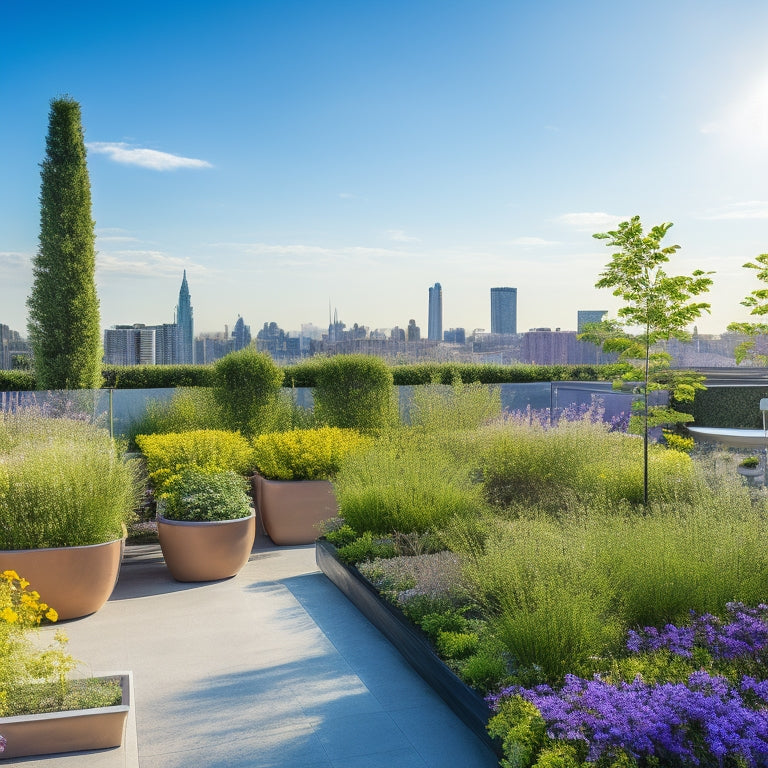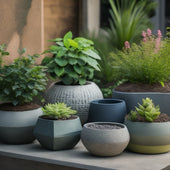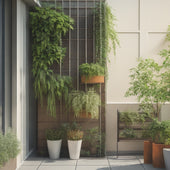
3 Best Rooftop Irrigation Systems for Vertical Gardens
Share
You're looking for an efficient and effective way to irrigate your rooftop vertical garden, and choosing the right system is essential for ideal plant growth and water conservation. Consider drip irrigation systems, which deliver water directly to roots, reducing evaporation and runoff, and offer superior customization options. Micro-sprinkler systems are another option, providing uniform watering patterns and promoting healthy root development. Finally, smart irrigation controllers enable precise control and real-time soil moisture monitoring, minimizing water waste. By exploring these options further, you'll uncover the perfect solution for your rooftop garden's unique needs.
Key Takeaways
• Drip irrigation systems deliver water directly to plant roots, reducing evaporation and runoff, making them ideal for rooftop gardens with limited water supply.
• Micro-sprinkler systems provide uniform watering patterns and promote healthy root development, making them suitable for vertical gardens with varying plant needs.
• Smart irrigation controllers optimize water distribution, minimize waste, and ensure plant health by utilizing real-time soil moisture monitoring and weather data.
• Customizable emitters in drip irrigation systems cater to specific plant needs, while micro-sprinkler systems simplify maintenance by targeting specific areas.
• Both drip and micro-sprinkler systems conserve water, reducing costs and environmental footprint, making them suitable for rooftop gardens.
Drip Irrigation Systems for Rooftops
When designing a rooftop irrigation system for your vertical garden, consider implementing a drip irrigation system, which delivers water directly to the roots of plants, reducing evaporation and runoff.
This approach offers superior drip efficiency, guaranteeing that your plants receive the right amount of water exactly where they need it. As a result, you'll enjoy significant water conservation benefits, which is especially important for rooftop gardens where water supply may be limited.
Drip irrigation systems are also highly customizable, allowing you to tailor the system to your specific plants' needs. By installing emitters with varying flow rates, you can make certain that each plant receives the ideal amount of water. This targeted approach reduces waste and minimizes the risk of overwatering, which can be detrimental to plant health and safety.
Additionally, drip irrigation systems are relatively low-maintenance and can be easily automated, making it easy to guarantee your plants receive the right amount of water even when you're not around.
Micro-Sprinkler Systems for Verticals
How do micro-sprinkler systems, which release tiny droplets of water over a specific area, benefit your rooftop vertical garden by providing a more uniform watering pattern and encouraging healthy plant growth?
For starters, micro-sprinkler systems guarantee that water is distributed evenly throughout your vertical garden, reducing the risk of overwatering or underwatering. This precise watering technique promotes healthy root development, which in turn supports robust plant growth.
Additionally, micro-sprinkler systems are highly efficient, using considerably less water than traditional sprinkler systems. This not only saves you money on your water bill but also reduces the risk of waterlogged soil and associated maintenance issues.
When it comes to vertical garden maintenance, micro-sprinkler systems make it easy to target specific areas of your garden, reducing the need for manual watering and minimizing the risk of human error.
Smart Irrigation Controllers for Gardens
By integrating smart irrigation controllers into your rooftop vertical garden, you can take your watering strategy to the next level, leveraging advanced technology to optimize water distribution and plant growth.
These controllers enable precise control over your irrigation system, guaranteeing that your plants receive the right amount of water at the right time. With smart moisture sensors, you can monitor soil moisture levels in real-time, adjusting your watering schedule accordingly. This guarantees that your plants receive the perfect amount of moisture, reducing the risk of overwatering or underwatering.
Automated watering systems can be programmed to water your plants at specific times of the day, taking into account factors such as weather, soil type, and plant species. This not only saves you time but also reduces water waste, making your rooftop garden more sustainable.
Smart irrigation controllers can also be integrated with other systems, such as weather stations and rain sensors, to further optimize water distribution. By investing in a smart irrigation controller, you can create a more efficient, effective, and safe watering system for your rooftop vertical garden.
With precise control and real-time monitoring, you can guarantee that your plants thrive while minimizing water waste and reducing your environmental footprint.
Frequently Asked Questions
How Often Should I Water My Rooftop Garden in Hot Summer Months?
You should water your rooftop garden daily during hot summer months, increasing watering frequency to twice a day if temperatures exceed 90°F (32°C) to prevent water stress and guarantee ideal growth in extreme summer heat.
Can I Use Rainwater Harvesting With My Rooftop Irrigation System?
"You're a master conductor, orchestrating your rooftop garden's symphony of life. Yes, you can use rainwater harvesting with your rooftop irrigation system, incorporating rainwater filtration and rooftop water storage to conserve this precious resource safely and efficiently."
Are Rooftop Irrigation Systems Suitable for Windy or Exposed Locations?
You'll want to guarantee your rooftop irrigation system can withstand harsh conditions; look for systems with high wind resistance and durable materials to minimize damage and guarantee reliable performance in exposed locations.
Do I Need to Add Fertilizers to My Irrigation Water for Optimal Growth?
You'll want to contemplate adding fertilizers to your irrigation water, balancing nitrogen, phosphorus, and potassium levels, as you adjust irrigation frequency to optimize growth, ensuring you choose fertilizer types that won't clog your system or harm plants.
Can I Automate My Rooftop Irrigation System to Water at Night Only?
You can automate your rooftop irrigation system to water at night only, leveraging night irrigation benefits like reduced evaporation and minimized fungal growth, while ensuring safety through precise automation that avoids waterlogging and overwatering.
Related Posts
-

5 Best DIY Planter Ideas to Upcycle Concrete
You're about to breathe new life into discarded concrete blocks by transforming them into functional and visually app...
-

5 Best DIY Planter Ideas to Upcycle Concrete
You're about to breathe new life into discarded concrete blocks by transforming them into functional and visually app...
-

5 Best DIY Planter Ideas to Upcycle Concrete
You're about to breathe new life into discarded concrete blocks by transforming them into functional and visually app...
-

5 Best DIY Planter Ideas to Upcycle Concrete
You're about to breathe new life into discarded concrete blocks by transforming them into functional and visually app...
-

5 Best DIY Planter Ideas to Upcycle Concrete
You're about to breathe new life into discarded concrete blocks by transforming them into functional and visually app...
-

5 Best DIY Planter Ideas to Upcycle Concrete
You're about to breathe new life into discarded concrete blocks by transforming them into functional and visually app...
-

5 Best DIY Planter Ideas to Upcycle Concrete
You're about to breathe new life into discarded concrete blocks by transforming them into functional and visually app...
-

5 Best DIY Planter Ideas to Upcycle Concrete
You're about to breathe new life into discarded concrete blocks by transforming them into functional and visually app...
-

5 Best DIY Planter Ideas to Upcycle Concrete
You're about to breathe new life into discarded concrete blocks by transforming them into functional and visually app...
-

5 Best DIY Planter Ideas to Upcycle Concrete
You're about to breathe new life into discarded concrete blocks by transforming them into functional and visually app...
-

5 Best DIY Planter Ideas to Upcycle Concrete
You're about to breathe new life into discarded concrete blocks by transforming them into functional and visually app...
-

5 Best DIY Planter Ideas to Upcycle Concrete
You're about to breathe new life into discarded concrete blocks by transforming them into functional and visually app...
-

5 Best DIY Planter Ideas to Upcycle Concrete
You're about to breathe new life into discarded concrete blocks by transforming them into functional and visually app...
-

5 Best DIY Planter Ideas to Upcycle Concrete
You're about to breathe new life into discarded concrete blocks by transforming them into functional and visually app...
-

5 Best DIY Planter Ideas to Upcycle Concrete
You're about to breathe new life into discarded concrete blocks by transforming them into functional and visually app...
-

5 Best DIY Planter Ideas to Upcycle Concrete
You're about to breathe new life into discarded concrete blocks by transforming them into functional and visually app...
-

5 Best DIY Planter Ideas to Upcycle Concrete
You're about to breathe new life into discarded concrete blocks by transforming them into functional and visually app...
-

5 Best DIY Planter Ideas to Upcycle Concrete
You're about to breathe new life into discarded concrete blocks by transforming them into functional and visually app...
-

3 Best Space-Saving Gardening Ideas for Urban Renters
You can turn even the smallest urban space into a lush oasis by utilizing clever space-saving gardening ideas. Maximi...
-

3 Best Space-Saving Gardening Ideas for Urban Renters
You can turn even the smallest urban space into a lush oasis by utilizing clever space-saving gardening ideas. Maximi...
-

3 Best Space-Saving Gardening Ideas for Urban Renters
You can turn even the smallest urban space into a lush oasis by utilizing clever space-saving gardening ideas. Maximi...
-

3 Best Space-Saving Gardening Ideas for Urban Renters
You can turn even the smallest urban space into a lush oasis by utilizing clever space-saving gardening ideas. Maximi...
-

3 Best Space-Saving Gardening Ideas for Urban Renters
You can turn even the smallest urban space into a lush oasis by utilizing clever space-saving gardening ideas. Maximi...
-

3 Best Space-Saving Gardening Ideas for Urban Renters
You can turn even the smallest urban space into a lush oasis by utilizing clever space-saving gardening ideas. Maximi...
-

3 Best Space-Saving Gardening Ideas for Urban Renters
You can turn even the smallest urban space into a lush oasis by utilizing clever space-saving gardening ideas. Maximi...
-

3 Best Space-Saving Gardening Ideas for Urban Renters
You can turn even the smallest urban space into a lush oasis by utilizing clever space-saving gardening ideas. Maximi...
-

3 Best Space-Saving Gardening Ideas for Urban Renters
You can turn even the smallest urban space into a lush oasis by utilizing clever space-saving gardening ideas. Maximi...
-

3 Best Space-Saving Gardening Ideas for Urban Renters
You can turn even the smallest urban space into a lush oasis by utilizing clever space-saving gardening ideas. Maximi...
-

3 Best Space-Saving Gardening Ideas for Urban Renters
You can turn even the smallest urban space into a lush oasis by utilizing clever space-saving gardening ideas. Maximi...
-

3 Best Space-Saving Gardening Ideas for Urban Renters
You can turn even the smallest urban space into a lush oasis by utilizing clever space-saving gardening ideas. Maximi...
-

3 Best Space-Saving Gardening Ideas for Urban Renters
You can turn even the smallest urban space into a lush oasis by utilizing clever space-saving gardening ideas. Maximi...
-

3 Best Space-Saving Gardening Ideas for Urban Renters
You can turn even the smallest urban space into a lush oasis by utilizing clever space-saving gardening ideas. Maximi...
-

10 Essential Tips to Prevent Disease in Vertical Gardens
You're about to discover the essential strategies to protect your vertical garden from disease, ensuring a thriving a...
-

10 Essential Tips to Prevent Disease in Vertical Gardens
You're about to discover the essential strategies to protect your vertical garden from disease, ensuring a thriving a...
-

10 Essential Tips to Prevent Disease in Vertical Gardens
You're about to discover the essential strategies to protect your vertical garden from disease, ensuring a thriving a...
-

10 Essential Tips to Prevent Disease in Vertical Gardens
You're about to discover the essential strategies to protect your vertical garden from disease, ensuring a thriving a...
-

10 Essential Tips to Prevent Disease in Vertical Gardens
You're about to discover the essential strategies to protect your vertical garden from disease, ensuring a thriving a...
-

10 Essential Tips to Prevent Disease in Vertical Gardens
You're about to discover the essential strategies to protect your vertical garden from disease, ensuring a thriving a...
-

10 Essential Tips to Prevent Disease in Vertical Gardens
You're about to discover the essential strategies to protect your vertical garden from disease, ensuring a thriving a...
-

10 Essential Tips to Prevent Disease in Vertical Gardens
You're about to discover the essential strategies to protect your vertical garden from disease, ensuring a thriving a...
-

10 Essential Tips to Prevent Disease in Vertical Gardens
You're about to discover the essential strategies to protect your vertical garden from disease, ensuring a thriving a...
-

10 Essential Tips to Prevent Disease in Vertical Gardens
You're about to discover the essential strategies to protect your vertical garden from disease, ensuring a thriving a...
-

10 Essential Tips to Prevent Disease in Vertical Gardens
You're about to discover the essential strategies to protect your vertical garden from disease, ensuring a thriving a...
-

10 Essential Tips to Prevent Disease in Vertical Gardens
You're about to discover the essential strategies to protect your vertical garden from disease, ensuring a thriving a...
-

10 Essential Tips to Prevent Disease in Vertical Gardens
You're about to discover the essential strategies to protect your vertical garden from disease, ensuring a thriving a...
-

10 Essential Tips to Prevent Disease in Vertical Gardens
You're about to discover the essential strategies to protect your vertical garden from disease, ensuring a thriving a...
-

10 Essential Tips to Prevent Disease in Vertical Gardens
You're about to discover the essential strategies to protect your vertical garden from disease, ensuring a thriving a...
-

10 Essential Tips to Prevent Disease in Vertical Gardens
You're about to discover the essential strategies to protect your vertical garden from disease, ensuring a thriving a...
-

10 Essential Tips to Prevent Disease in Vertical Gardens
You're about to discover the essential strategies to protect your vertical garden from disease, ensuring a thriving a...
-

10 Essential Tips to Prevent Disease in Vertical Gardens
You're about to discover the essential strategies to protect your vertical garden from disease, ensuring a thriving a...
-

10 Essential Tips to Prevent Disease in Vertical Gardens
You're about to discover the essential strategies to protect your vertical garden from disease, ensuring a thriving a...
-

10 Essential Tips to Prevent Disease in Vertical Gardens
You're about to discover the essential strategies to protect your vertical garden from disease, ensuring a thriving a...
-

10 Essential Tips to Prevent Disease in Vertical Gardens
You're about to discover the essential strategies to protect your vertical garden from disease, ensuring a thriving a...
-

10 Essential Tips to Prevent Disease in Vertical Gardens
You're about to discover the essential strategies to protect your vertical garden from disease, ensuring a thriving a...
-

10 Essential Tips to Prevent Disease in Vertical Gardens
You're about to discover the essential strategies to protect your vertical garden from disease, ensuring a thriving a...
-

10 Essential Tips to Prevent Disease in Vertical Gardens
You're about to discover the essential strategies to protect your vertical garden from disease, ensuring a thriving a...
-

10 Essential Tips to Prevent Disease in Vertical Gardens
You're about to discover the essential strategies to protect your vertical garden from disease, ensuring a thriving a...
-

10 Essential Tips to Prevent Disease in Vertical Gardens
You're about to discover the essential strategies to protect your vertical garden from disease, ensuring a thriving a...
-

10 Essential Tips to Prevent Disease in Vertical Gardens
You're about to discover the essential strategies to protect your vertical garden from disease, ensuring a thriving a...
-

10 Essential Tips to Prevent Disease in Vertical Gardens
You're about to discover the essential strategies to protect your vertical garden from disease, ensuring a thriving a...
-

10 Essential Tips to Prevent Disease in Vertical Gardens
You're about to discover the essential strategies to protect your vertical garden from disease, ensuring a thriving a...


